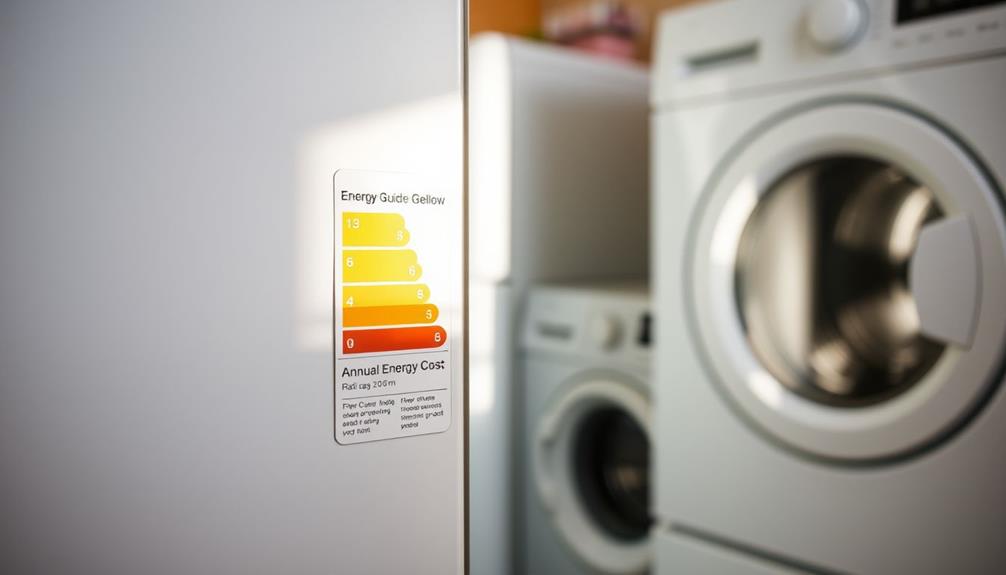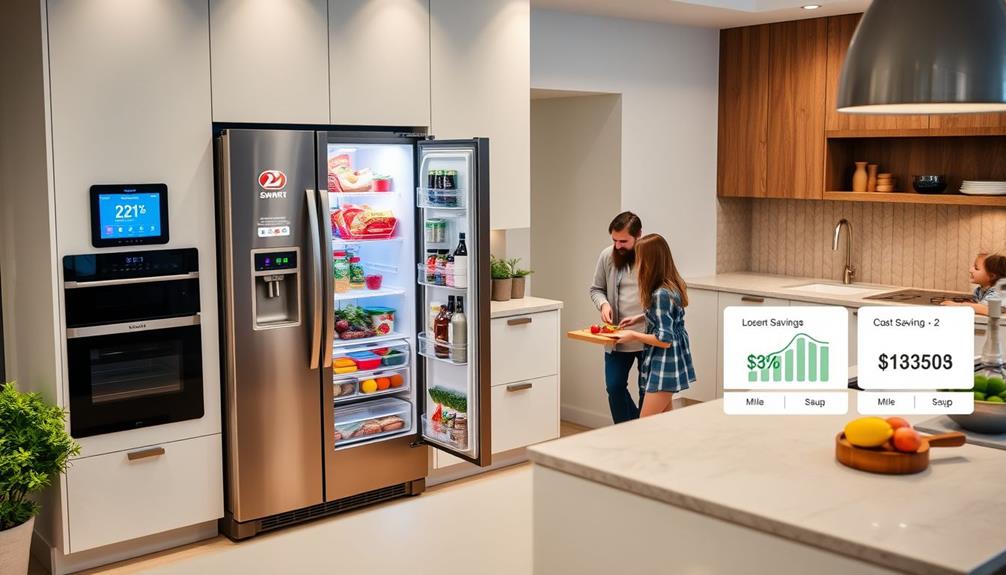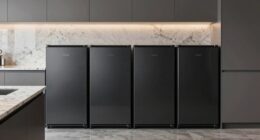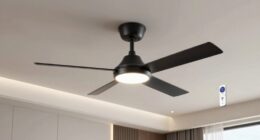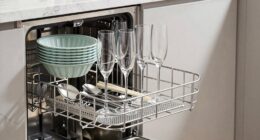Power surges have the potential to cause severe damage to your appliances, resulting in costly repairs and significantly reducing their lifespan. These surges can be caused by internal issues such as faulty wiring or overloaded circuits, as well as external factors like lightning strikes. Warning signs of a surge may include flickering lights or unusual odors. To safeguard your devices, it is recommended to use high-quality surge protectors and consider investing in a whole-house system for comprehensive protection. Additionally, performing regular maintenance and unplugging appliances during storms can also help prevent damage. By taking these precautions, you can effectively protect your appliances, ultimately extending their longevity and optimizing their performance.
Key Takeaways
- Power surges, often caused by internal sources, can significantly damage appliances over time, leading to costly repairs or replacements.
- Signs of power surge damage include flickering lights, blown fuses, and burning smells, indicating the need for immediate attention.
- Using surge protectors with high joule ratings and installing whole-house surge protection can safeguard appliances from voltage spikes.
- Regular maintenance and inspection of electrical systems help identify issues before they escalate into major problems affecting appliance performance.
- Unplugging sensitive devices during storms and using quality surge protectors can extend the lifespan and efficiency of household appliances.
Definition of Power Surges
A power surge is fundamentally a sudden spike in electrical voltage that can exceed the standard 120 volts found in U.S. homes, sometimes reaching thousands of volts. These surges can occur unexpectedly and may last only microseconds, but the damage they cause to your electrical appliances can be significant.
While you mightn't notice minor surges, they can cumulatively harm sensitive electronics, leading to reduced performance and even total breakdowns.
Most power surges originate from internal sources, accounting for up to 80% of incidents in homes. Faulty wiring and the operation of high-power devices are common culprits. When your home's wiring is compromised, the risk of surges increases, potentially affecting everything from your refrigerator to your computer, especially if you consider the importance of appliance surge protection.
To protect your valuable electrical appliances, implementing surge protection is essential. Surge protectors can help shield your devices from the damage caused by these voltage spikes, prolonging their lifespans and maintaining their efficiency.
Common Causes of Power Surges

Power surges can sneak up on you from various sources, often starting right inside your home.
Devices with motors cycling on and off are common culprits, but weather-related events like lightning strikes can also wreak havoc.
Additionally, environmental factors can contribute to surges, especially when extreme temperatures strain electrical systems.
Understanding these causes is key to protecting your appliances from unexpected damage, particularly with systems that rely on thermal energy transfer like heat pumps thermal energy transfer basics.
Internal Electrical Sources
Often, internal electrical sources are responsible for up to 80% of power surges in homes. These surges often stem from appliances and devices cycling on and off, particularly those with motors. When high-power devices like refrigerators, air conditioners, and washing machines kick in, they can create sudden spikes in electrical demand, causing voltage fluctuations that impact your entire home.
Additionally, just like the significance of regular vet check-ups for dogs to monitor health, maintaining your home's electrical systems is vital to prevent potential issues.
Consider these common internal sources of power surges:
- Faulty wiring that leads to electrical arcing and can damage sensitive appliance components.
- Loose connections in outdated electrical systems found in many older homes.
- Overloaded circuits, especially when multiple high-power devices are used simultaneously.
- Regular maintenance lapses that allow minor issues to escalate into significant problems.
Taking steps to understand and address these internal sources is imperative. Regular maintenance and inspections of your home's electrical systems can help you identify potential issues before they become serious problems.
Weather-Related Events
Severe weather can wreak havoc on your home's electrical system, making it essential to understand how these events contribute to power surges. Lightning strikes, for example, are responsible for over 20 million strikes annually, often leading to significant surges. These surges can exceed 220 volts, far surpassing your system's typical 120 volts.
Severe storms can also disrupt power lines, causing voltage spikes that impact your appliances. Up to 80% of power surges originate from high-power electrical devices cycling on and off during extreme weather. Additionally, utility company maintenance during adverse conditions can generate artificially created surges, posing risks to your electronics.
Here's a quick overview of common weather-related events and their effects on power surges:
| Weather Event | Effect on Power Surges |
|---|---|
| Lightning Strikes | Can cause surges over 220 volts |
| Severe Storms | Disrupt power lines, causing spikes |
| High Winds | May lead to downed lines |
| Utility Maintenance | Creates artificially generated surges |
Understanding these factors is vital for protecting your appliances and ensuring their longevity against power surges.
Equipment Malfunctions
When it comes to protecting your appliances, understanding the common causes of power surges is crucial. You might be surprised to learn that internal sources account for up to 80% of these surges, often triggered by devices with motors, like your refrigerator or air conditioner cycling on and off.
Additionally, appliances like garage door openers can also contribute to fluctuations in electrical flow. Outdated electrical systems, especially those with aluminum wiring, can lead to loosening connections that cause equipment malfunctions.
Here are some other notable causes of power surges:
- Lightning strikes: Over 20 million occur annually in the U.S., potentially damaging multiple appliances at once.
- Fallen trees: They can disrupt power lines and create unexpected surges.
- Accidents: Car crashes involving utility poles can also induce surges.
- Utility company maintenance: Issues here can generate artificial surges, increasing your risk.
To safeguard your valuable appliances, consider investing in whole-house surge protection. By addressing these common causes of power surges, you can greatly reduce the likelihood of equipment malfunctions and guarantee your appliances remain safe and operational.
Signs of Power Surge Damage

Power surges can leave clear signs of damage that you shouldn't ignore. Recognizing these signs early can help protect your appliances and electronic devices from further issues. Here are some key indicators of power surge damage to watch for:
| Signs | Description | Action Needed |
|---|---|---|
| Frequent blown fuses | Indicates underlying issues in the electrical system | Consult an electrician |
| Flickering or dimming lights | Suggests voltage fluctuations when larger appliances activate | Check surge protection devices |
| Flashing clocks | Signals a power surge interrupted operation and time settings | Reset and monitor for recurrence |
| Burning smells | A serious indicator of potential surge damage affecting safety | Turn off power and investigate |
If you notice any of these signs, it's essential to act quickly. Addressing power surge damage not only extends the life of your appliances but also safeguards your home's electrical system. Implementing surge protection can further minimize risks and keep your electronic devices safe from unexpected voltage spikes.
Impact on Appliance Lifespan

Over time, the impact of power surges on your appliances can be significant, leading to a noticeable decline in their lifespan. When appliances experience frequent power surges, they face electrical overloads that accelerate wear on their internal components. This exposure can create cumulative damage, meaning that even small surges eventually lead to appliance failure.
Additionally, protecting your investments through proper measures can help mitigate financial risks associated with unexpected appliance failures, similar to how diversification of retirement portfolio reduces risk exposure.
Consider how this affects your home:
- Fridge and freezer: Spoilage due to malfunctioning compressors.
- Washing machine: Erratic cycles and premature breakdowns.
- Microwave: Inconsistent heating and circuit board failures.
- Television: Flickering screens and unexpected shutdowns.
Sensitive electronic components, like circuit boards, are especially vulnerable. Repeated surges can manifest as intermittent issues, complicating repairs and leading to more expensive fixes.
Studies show that the average lifespan of appliances can shrink by as much as 30% due to the detrimental effects of power surges. This highlights the importance of surge protection in preserving the longevity of your appliances.
Protecting Appliances From Surges
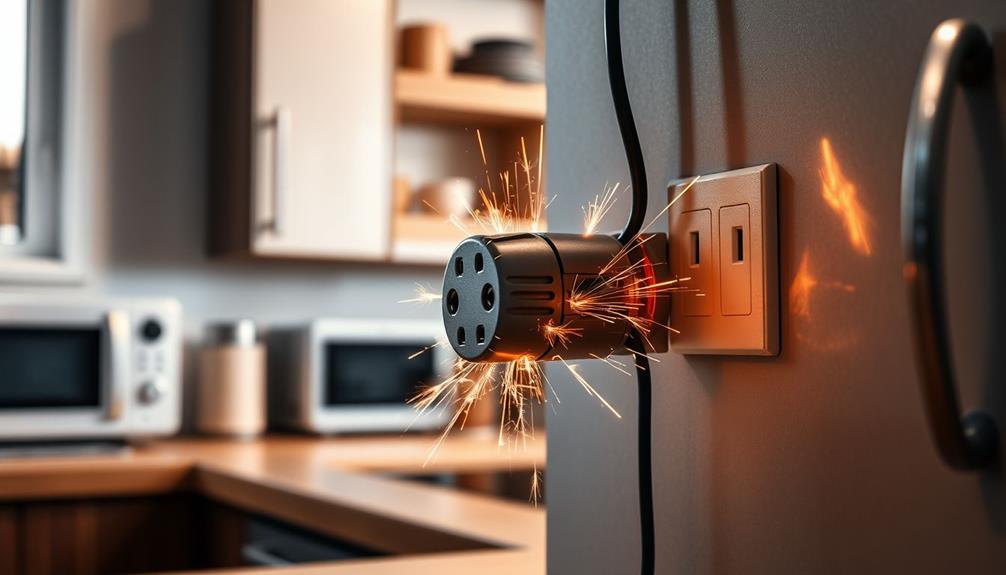
To effectively shield your appliances from surges, it is vital to implement a variety of protective measures. Start by using surge protectors with a high joule rating to divert excess voltage, minimizing damage during power surges. Consider installing whole-house surge protectors at your main electrical service panel, as these devices offer extensive coverage for all appliances, including refrigerators and HVAC systems.
Additionally, during severe storms, it is wise to unplug sensitive appliances to prevent lightning-induced surges that can exceed 220 volts. Regular maintenance and timely replacement of your surge protectors are important since they can wear out after absorbing multiple surges.
Educating yourself on the signs of power surges, like flickering lights and burnt smells, can help you catch issues early and protect your appliances.
Here's a quick reference table for better understanding:
| Measure | Description | Benefits |
|---|---|---|
| Surge Protectors | Divert excess voltage from appliances | Minimizes risk of damage |
| Whole-House Surge Protectors | Installed at the main electrical panel | Protects all devices in your home |
| Unplugging Appliances | Disconnecting during severe storms | Prevents lightning-induced surges |
| Regular Maintenance | Replacing old surge protectors | Guarantees ongoing effectiveness |
| Educating Homeowners | Recognizing signs of power surges | Early detection and prevention |
Choosing Surge Protectors

Selecting the right surge protector is crucial for safeguarding your appliances and electronics from unexpected voltage spikes. When you choose a surge protector, prioritize features that improve your protection.
Additionally, a well-ventilated environment and proper air circulation from devices like ceiling fans can help reduce the likelihood of overheating, which may contribute to electrical issues.
Here are key aspects to take into account:
- High joule rating: Look for a surge protector with a high joule rating, which indicates its capacity to absorb larger surges.
- Multiple outlets: Confirm the device has multiple outlets, allowing you to connect various appliances safely and efficiently.
- Voltage clamping: Check the voltage clamping and response time specifications. A lower clamping voltage means it reacts faster to surges, protecting your devices better.
- EMI/RFI noise filtering: Opt for surge protectors with EMI/RFI noise filtering to shield sensitive electronics from interference, guaranteeing peak performance.
Additionally, verify if the surge protector includes connected equipment coverage, providing financial protection in case of failure.
Professional Repair Services
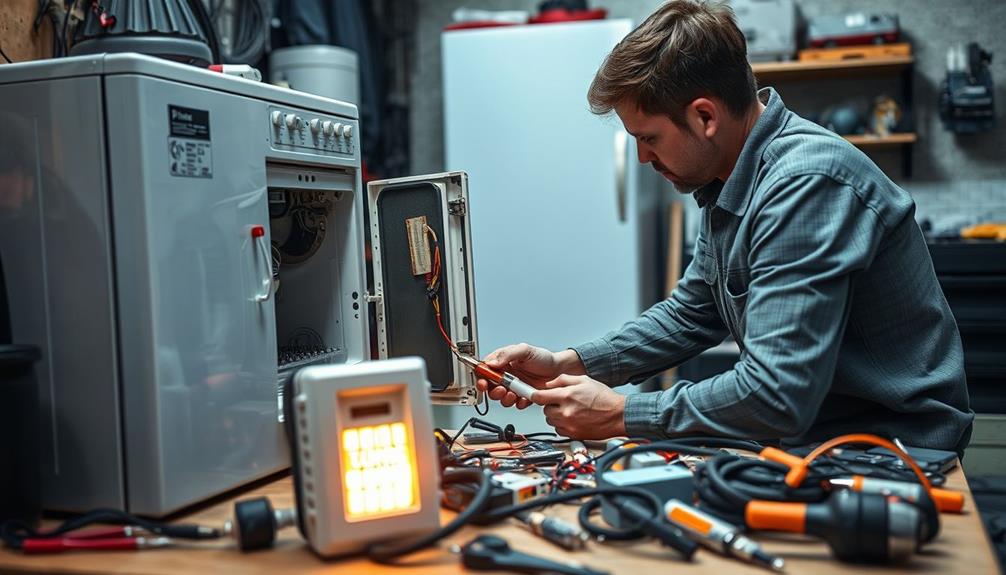
When your appliances suffer from power surges, you need skilled technicians who can quickly diagnose and fix the damage.
Professional repair services not only provide efficient solutions but also offer proactive maintenance suggestions to keep your appliances running smoothly, similar to how home cleaning services operate.
Skilled Technician Expertise
Skilled technicians can swiftly diagnose and repair various appliance issues caused by power surges, guaranteeing your devices are back in working order as quickly as possible.
Their expertise is akin to the comprehensive suite of services offered by professionals in other fields, allowing them to tackle a wide range of appliance repair needs, from simple fixes to more complex problems.
With specialized tools and access to necessary parts, they can effectively restore your electronics and appliances, something challenging for DIY repairs.
Consider the benefits of hiring a skilled technician:
- Thorough inspections to identify immediate surge damage and underlying issues.
- Expert advice on surge protection measures to prevent future incidents.
- Access to quality parts that guarantee long-lasting repairs.
- Warranties or guarantees on their work for peace of mind.
Efficient Repair Solutions
Finding efficient repair solutions for appliances affected by power surges can make all the difference in restoring functionality quickly. Engaging professional services guarantees that skilled technicians accurately diagnose and fix issues caused by damaging power. This expertise not only speeds up the repair process but can also save you money compared to DIY repairs, as professionals can uncover underlying problems that mightn't be immediately visible.
Additionally, maintaining that your appliances are well-maintained can prevent issues in the first place, much like how a self-cleaning brush roll can enhance the performance of a vacuum by minimizing hair wrap.
Moreover, many appliance repair companies offer warranties or guarantees on their services, giving you peace of mind regarding the longevity of the repairs made after surge damage. With access to specialized tools and replacement parts, these technicians provide efficient repairs that minimize downtime and restore your appliances to ideal working condition.
It's also beneficial to ask about preventative maintenance advice from technicians. They can help you implement strategies that extend the lifespan of your appliances and reduce the risk of future surge-related issues.
Don't forget to check your homeowners insurance policies, as they may cover repair costs, making professional appliance repair an even smarter choice for your home.
Proactive Maintenance Suggestions
Regular maintenance is key to safeguarding your appliances from power surges. By engaging professional repair services, you can identify potential vulnerabilities and address them before they lead to significant damage. Proactive maintenance not only prevents power surges but also extends the lifespan of your appliances.
Additionally, implementing a robust content strategy can enhance your understanding of the best practices in appliance care. Here are some suggestions for ensuring your appliances remain in ideal condition:
- Schedule routine maintenance visits to inspect appliances for signs of wear.
- Have technicians check for damaged circuit boards or malfunctioning components.
- Ask for recommendations on installing surge protectors tailored to your specific needs.
- Consider whole-house surge protection systems to safeguard all your appliances.
These steps will enhance the performance of your appliances and provide peace of mind against potential surge-related issues.
Remember, electrical current fluctuations can cause cumulative damage over time. By staying ahead with regular inspections and timely repairs, you can effectively prevent power surges from wreaking havoc on your home.
Don't wait for problems to arise; prioritize proactive maintenance today!
Maintenance Tips for Appliances

Maintaining your appliances is fundamental for their longevity and performance, especially when it comes to protecting them from power surges. Start by regularly inspecting cords and plugs for signs of wear or damage. Frayed wires can increase the risk of electrical hazards and make your appliances vulnerable to power surges.
Keep your appliances clean and well-ventilated to prevent overheating, which can exacerbate the effects of power surges on internal components. Scheduling professional maintenance checks for major appliances at least once a year is another important maintenance tip. This guarantees they're functioning effectively and helps identify any potential vulnerabilities to power surges.
Using high-quality surge protectors is essential, too. Choose surge protectors with a joule rating suitable for the devices you're protecting, and remember to replace them every few years for continued effectiveness against power surges.
Finally, consider implementing a whole-house surge protector. This is especially important in areas prone to severe weather conditions, as it safeguards all your appliances from sudden voltage spikes.
Contacting Experts for Help

When power surges strike, reaching out to experts can make all the difference in restoring your appliances' functionality. Skilled technicians provide expert diagnosis and can identify surge-related damages in your home appliances, guaranteeing targeted repairs and maintenance. This not only saves you time but also money, as they efficiently tackle complex issues that may arise from sudden electrical spikes.
Consider the benefits of contacting professionals:
- Immediate assistance for urgent surge-related repairs
- Expert advice on surge protection measures
- Thorough examination of your electrical panel
- Restoration of peak functionality for your devices
Many appliance repair companies also offer consultations to help you implement surge protection strategies, extending the lifespan of your appliances.
By engaging with these experts, you'll gain peace of mind knowing that your household routines won't face unnecessary disruptions.
Don't wait until it's too late; when power surges occur, having a reliable professional on speed dial can protect your investments and guarantee your home runs smoothly.
Frequently Asked Questions
How to Protect Appliances From Electrical Surges?
To protect your appliances from electrical surges, use high-quality surge protectors, unplug devices during storms, and consider a whole-house surge protector. Regularly check and replace your surge protectors for peak safety and effectiveness.
How Does a Power Surge Affect Appliances?
Did you know that 60% of surge damage goes unnoticed until it's too late? A power surge can instantly ruin your appliances, causing malfunctions, shortening their lifespan, or even leading to complete failure, requiring costly repairs.
How to Save Home Appliances From High Voltage?
To save your home appliances from high voltage, use quality surge protectors, unplug devices during storms, install a whole-house surge protector, and schedule regular electrical maintenance to guarantee everything's working properly and safely.
Are Surge Protectors Safe for Appliances?
Picture a knight shielding your electronics from a storm; surge protectors are your valiant defenders. Yes, they're safe for appliances, but make certain you choose high-quality ones and replace them when necessary for peak protection.
Conclusion
In the dance of electricity, power surges can lead your appliances to an unexpected waltz with disaster. By understanding the causes and signs of surge damage, you can protect your devices and extend their lifespan. Investing in quality surge protectors is like giving your appliances a sturdy shield against unpredictable voltage spikes. Remember, regular maintenance and knowing when to call in the pros are key to keeping your home running smoothly. Don't let surges steal the spotlight from your appliances!




